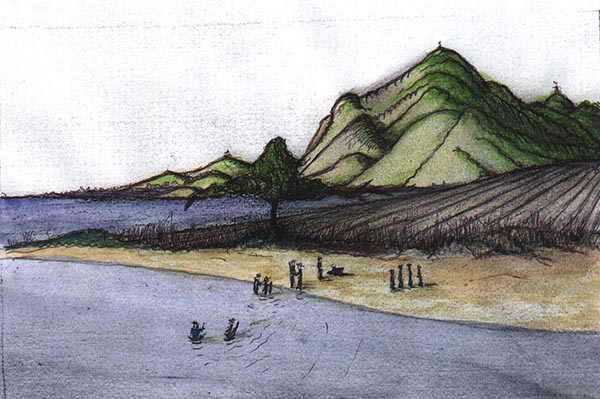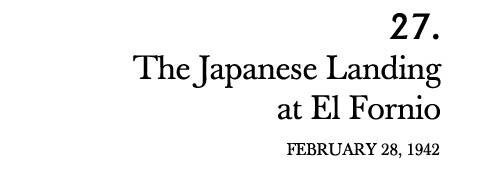|
ON FEBRUARY 23, 1942, around
7:15 PM, just as President Franklin Roosevelt was delivering one of his
fireside chats to a nation newly at war, a Japanese I-17 Sensuikan class
submarine lobbed a number of shells onto the beach just north of Santa
Barbara. It is calculated that thirteen shells in all were sent into the
oil fields at Ellwood Beach, although reports vary. One shell did not
explode and simply dug straight into the dirt (and continues to be in
possession of a local family). Although damage was minimal—about
five hundred dollars was spent to repair an oil rig—nerves were nevertheless
frayed and wartime jitters increased.
A visit to the area nowadays will show only open coast and few reminders
of the days when Ellwood was a larger part of the petroleum industry.
While the location still supports off-shore drilling interests, with two
large tanks set back just off of the beach head and platforms visible
off the coast, the remainder of the area today is a wildlife and research
refuge.
Legend has it that the commander of the submarine, Nishino Kozo,
had visited the area in the late 1930s as the skipper of an oil tanker.
Taking time to refuel there, he was invited on land to view the facilities.
A small ceremony took place upon his arrival. As he came up the path to
meet his hosts, Mr. Kozo allegedly slipped and fell into a patch of prickly
pear cactus. Rather than demonstrate the sort of formality and respect
for a dignitary that Mr. Kozo expected, it is said that some in the crowd
snickered at his mishap.
Mr. Kozo never forgot.
The shelling of the beach—utilizing the sub’s five-and-a-half
inch deck guns—lasted only a short while. Americans on shore reported
the incident quickly but not in enough time to militarily respond to the
Japanese provocation (although pitch forks were handed out to some in
the area). The night passed into early morning and it seemed that the
sub was gone. Some reports suggest the vessel disappearing towards the
south end of the Santa Barbara Channel.
The next day, before sunrise, Jess Ueda rose at the usual hour to look
over the coastal strawberry fields he managed on land he had inherited
from his father. The fields, approximately six acres located ten miles
south of downtown El Fornio, along the beach below Three White Hills,
were in the early stages of the strawberry season.
“I remember being angry that morning,” Mr. Ueda
says some sixty years later, “Because we had been given orders the
previous week that we were going to have to leave, on orders of the government
. . . I knew that we would not be there for the harvest because we were
to report to Pomona by May 7.”
Just before the light, Mr. Ueda wandered towards the beach which he did
every morning to look over the property. The dogs followed.
“The began to get excited,” Ueda recalls to this day.
“Not really barking, but looking out at the water, panting, yelping
here and there.”
They ran towards the surf. “My eyes had adjusted by then and I could
see people and a small boat landing. They were speaking Japanese! My parents,
who had come from Japan, had taught me Japanese, but I wasn’t really
fluent. I had never been to Japan by that time and as a family, we spoke
our own kind of Japanese,” he laughs. “Like the way people speak
Spanglish. But I could hear these sailors talking to each other and also
to the dogs. They were all mutts—Jack Russell mixed with Lab, a little
Aussie Shepard—these guys had never seen those kind of dogs and the
animals didn’t seem to mind them. I figured that they were some fisherman
who had gotten into trouble.”
By that time others from the house had come down to the beach, including
Ueda’s wife, Jane. Dawn moved in, the sun coming up.
“You could see their rifles and uniforms. There was five, one
of them staying with that puny landing boat. In the distance was the submarine’s
conning tower. It took a minute for me to realize what was happening.
It was the Imperial Navy!”
Mr. Ueda describes the encounter as congenial but tense.
“The sailors had not anticipated encountering other Japanese,”
Ueda continues, “And they were tired—plus the dogs, which seemed
on the verge of being shot at one point. Yet the idea was completely formalized
and daring,” Ueda nodded and laughed. “I think they simply wanted
to set foot on American soil and then make a clean getaway.
Ueda adds, “One of my workers, Hiro, was born in Japan. He
spoke with the most with the sailors. Two of the boys were from Hokkaido.
They had come all the way across the Pacific in that submarine. In all
of my astonishment, I started thinking—and I could see my wife, who
was born here like me, felt the same way—here we are trying to explain
to authorities that we are loyal Americans, with no political connection
to Japan, and suddenly here I am talking to the Japanese military!
“I politely asked them to go. And they obliged. I put a finger
to my mouth, `Hush, hush.’ One of my colleagues brought them strawberries,
which they took on board the boat, although I strictly forbade them from
taking any pictures. Can you imagine? We were fortunate the light was
bad because one of them had a camera . . . The whole encounter lasted
about five minutes, really. A long five minutes!” Ueda concludes
wryly.
The sailors headed back to their vessel. The Ueda family, workers
and dogs watched as the ship submersed itself and disappeared.
The next morning papers were full of the news about the shelling at Ellwood.
Immediately, Ueda and the others made a pact to say nothing. “We
were already loosing everything,” he observes. “This, I felt
at the time and still do, would completely jeopardize our situation.”
On May 7, the Ueda family left their farm along the coast and headed
for Pomona, California to report to authorities for relocation. They spent
the remainder of the war effort at Manzanar. Their second son, John, was
born there, as was their first daughter, Sarah. After the war they returned
to the area, although their farm by this time was now owned by a Texas
family. In 1962, son John graduated from Stanford Law school. He established
a private practice that began doing pro bono work for Japanese dispossessed
during the war. By 1982, John Ueda was able to win back the family land.
He currently works for the State’s Attorney-General in Sacramento.
As for Ellwood Beach, you can still see a stand of prickly pear
cactus holding strong next to one of the big tanks.
RELATED LINKS
http://www.rotten.com/library/history/war/wwii/
http://www.ww2pacific.com/japsubs.html
|


